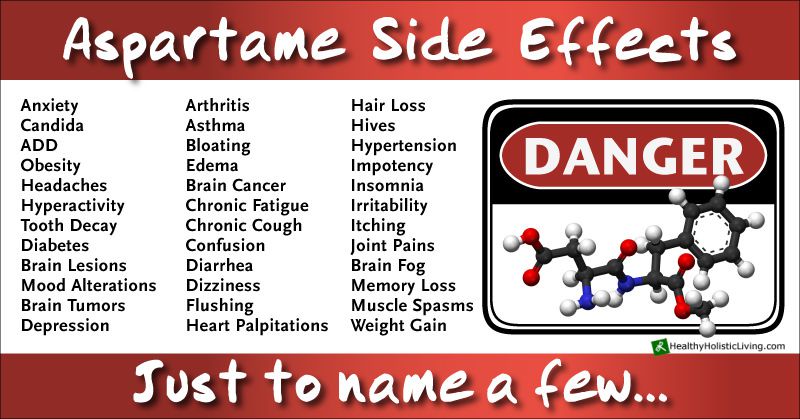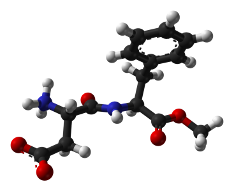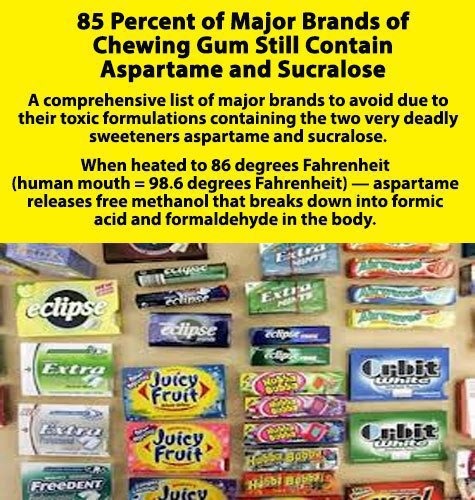Aspartame
If you've studied MS, you've probably run into aspartame as one that is known to have similar symptoms as those associated with multiple sclerosis. It's an artificial sweetener that was discovered in 1965 by James M. Schlatter. It wasn't introduced into the food supply until 1980. It's a non-saccharide sweetener used as a sugar substitute in many foods and beverages. Although many manufacturers are choosing to remove it.
Chemically it is a methyl-ester; a phenylalanine/aspartic acid dipeptide. I know that's a mouthful and equally confusing or not a need to know if you're not a scientist or studying chemistry at the moment. And if you really want to know what all of that means, you can easily do a google search and find out.
One thing you probably do need to know is that it breaks down into a substance called phenylalanine. For this reason, people who have PKU or phenylketonuria should not be eating foods that contain it. Specifically, PKU is a rare genetic condition where the body doesn't have enough of the enzyme phenylalanine hydroxylase (PAH).
This deficiency causes phenylalanine to build up in the body, forming compounds like phenylpyruvate or phenylketone, which doctors can detect in urine tests. The condition is treatable, but if it's left untreated, it can disrupt brain development, leading to intellectual disability, brain damage, and seizures.
Aspartame has been said to actually cause many of the common symptoms associated with multiple sclerosis. There are medical researchers, activists, and even conspiracy theorists who feel that it isn't safe for us to eat.
The Latest Evidence
- The International Agency for Research on Cancer (IARC) classified aspartame as "possibly carcinogenic to humans" based on limited evidence linking it to liver cancer.
- Some studies suggest possible associations between aspartame and neurodegeneration, strokes, and dementia, though more research is needed in these areas.
- Aspartame can increase levels of phenylalanine and aspartic acid in the brain, which is a serious concern for people with phenylketonuria (PKU)—a rare disorder where the body cannot break down phenylalanine.
It has been a controversial artificial sweetener for decades, and recent research continues to explore its potential health effects. Here’s what the latest evidence suggests:
Potential Risks
Potential Benefits
- A recent study found that replacing sugar with aspartame may help maintain better oral health, reducing acid production and dental erosion compared to sugar.
- Aspartame does not raise blood glucose levels, making it a preferred choice for those managing type 2 diabetes.
Regulatory Perspective
- The World Health Organization (WHO) and Food and Agriculture Organization (FAO) reaffirmed that aspartame is safe within current intake guidelines, with an acceptable daily intake of 40 mg/kg body weight.
- To exceed this limit, an adult weighing 70 kg would need to consume more than 9–14 cans of diet soda per day, assuming there are no other sources of aspartame their diet.
While concerns persist, regulatory bodies maintain that moderate consumption of aspartame is not a major health risk. However, ongoing research continues to assess its long-term effects.
Where Can You Find aspartame?
- Equal
- Equal-Measure
- NutraSweet
- Spoonful
- Canderel
- diet sodas and soft drinks
- instant breakfasts
- breath mints
- sugar-free chewing gum
- cocoa mixes
- frozen desserts
- gelatin desserts
- milk drinks
- teas
- instant coffee
- juices
- laxatives
- chewable vitamins
- chewing gum
- wine coolers
And it is used in about 6,000 products including these:
.......just to name a few.
You can even find it in pharmaceutical drugs and vitamin supplements. Diabetics use this sugar substitute more than any of the others available.
The controversy
As I said earlier, the American Diabetic Association or ADA, conducted a study to refute questions about the sweetener. The project was funded by the ADA and Ajinomoto – the company that owns the substance. Hmm...., I wonder where the objectiveness of all this comes into play.
The project "puts to rest" the negative questions floating around on the internet. There are websites and an email chain letter written by a woman named Nancy Markle. It turns out that no one knew who she was. This article that explains the "truth" about the Nancy (Betty) Markle (Martini) is here in this article. (Link will open a new window where you can read this article as well).
These links also talk about the effects of ingesting this artificial sweetener. One includes the number of people each of these symptoms happened to along with the percentage that represented. If you would like to read the "numbers", click the link – it will open in a new window.
And this article contains case studies or actual people – many with emails (I haven't tried them) – who have had experiences with using aspartame. If you like to read, this is a very long article. You won't be able to get through it in one sitting, so either bookmark it or print it out and read it that way.
And there was another article with the real Betty Martini explaining how her original letter about the sweetener was altered, however it is no longer available. It included cases of even more people who have been harmed by ingesting this excitotoxin.
So, what do you think? That's a lot of information. There is so much controversy surrounding this substance. Hopefully you will be able to come away with a better understanding about what's right and true about the aspartame and multiple sclerosis connection. If you happen to consume more than one or two of the products that contain this ingredient, it would be very easy to go over the "safe amount" and into the harmful zone. Just saying...
If the above is not enough to read, here is a video that also talks about the subject. I'm sure there are many more, but we might as well start somewhere. When you've finished listening, leave a comment to let us know what you think - true or false?
Dear Friends,
"Life in Spite of MS is a participant in the Amazon Services LLC Associates Program, an affiliate advertising program designed to provide a means for sites to earn advertising fees by advertising and linking to Amazon.com. We're also part of the Ebay Partner Network, another affiliate program."
We'd also like you to know it doesn't cost one cent more when you click through the links here on our blog. Not one single penny. And we will make a little extra cash when you do click through. We'll be ever so appreciative. You also have our word that we'll only link to things that we would use ourselves, (or wish we could have or use).
Sincerely,
Cir & Akrista
You are reading original content written by Akrista or Cir L'Bert of Life in Spite of MS. If you enjoyed reading this blog, please consider following us on Facebook, Twitter, Pinterest, and Instagram. See you there!
Privacy Policy ~ Advertising Policy ~ Disclaimer ~ Contact Us ~ About Us




New! Comments
Have your say about what you just read! Leave me a comment in the box below.